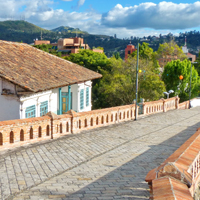Is the cost of living in Ecuador high?
We asked people about the cost of living in Ecuador, they wrote...
"If you live like the Ecuadorians live, it is very cheap as the basic salary per month is $425. Costs go up the more you live like an expat and the closer you get to approximating your same lifestyle in the USA or Canada. General rule of thumb is if the locals use it, there will be an inexpensive option. If not, it is expensive. If you can find it, Campbells Chicken soup in red and white label is about $3. Apple pie filling (can of fruit) is $11. Note that basic salary here is $425 per month. Utilities like electric (appox $20-25 per month, water $10 per month, gas is propane tanks, they bring a replacement tank into your house for $3.25 and take away the empty. Cell service about $25, internet about $35-40. Total utilities about $100 per month. Diesel is $1.70 per gallon. Gym memberships are often pricier than US, same with dry cleaning and laundry service," explained one expat living in Ecuador.
"Prices have risen some in the past 10 years but still, the cost of living is way better than in the States. My wife and I live very comfortably on little under $1,000 per month and that includes helping out other members of our family and traveling the country ( before the Covid-19 curtailed that! ). We do own our houses - a small 3-story in the city and a casa de campo out of town - but one of my stepsons and his family rent their semi-furnished, three-bedroom, 1 bath, home for about $300 per month. Utilities are very inexpensive. My monthly electric bill, inclusive of service charges for garbage and fire protection runs about $35 monthly. Water is $10.99 monthly, Gas for cooking is $3,00 a canister, and drinking water is $1.60 for a 22-liter container. Our conventional telephone is $8 and cable tv package & high-speed internet runs $85 per month. We pay $90 per month for IESS ( they just went up $5 ) for both of us - My wife is Ecuadoran and I am on her policy, so obviously my rate would be lower than yours might be, but you get a general idea. city-run Busses are 15 cents for Seniors and 35 cents for others. Taxis $1,50 - $2.50 depending on where you're going. My grocery bill at the supermarket for our family averages just under $300 per month and fresh foods, meats, fish, poultry, fruits & veggies, etc., and occasional restaurant take-out is never more than an additional $200 a month. Some imported food items are a bit more expensive than the States but usually not appreciatively. Fresh fish, meat, poultry, pork, etc., and fresh fruits and veggies are plentiful, inexpensive, and a larger variety than you'd find where you are," said another in Machala, Ecuador.
 AGS Worldwide Movers
AGS Worldwide MoversGet Quote
Relocating abroad soon? Make your move with AGS! AGS Worldwide Movers is a leader in the international moving industry. Our experience and expertise allows us to guarantee our clients the best quality moving services.
 AGS Worldwide Movers
AGS Worldwide MoversRelocating abroad soon? Make your move with AGS! AGS Worldwide Movers is a leader in the international moving industry. Our experience and expertise allows us to guarantee our clients the best quality moving services.
Get Quote
Please login to continue reading this article.
Not a member? Join Today (it's free).
Other Questions:
- What do I need to know before moving to Ecuador?
- How do I find a place to live in Ecuador?
- What is a typical expat home or apartment like in Ecuador?
- What is the average cost of housing in Ecuador?
- Should I buy or rent a home in Ecuador?
- What should I pack when moving to Ecuador?
- What cultural faux pas should I try to avoid making in Ecuador?
- Why do people move to Ecuador?
- What are healthcare services like in Ecuador?
- What are medical services in Ecuador like?
- What are typical rents in Ecuador?
- What appliances are typically included in a rental?
Is the cost of living in Ecuador high?
If you live in Ecuador, newcomers to Ecuador would love to hear your answer to this question:
About the Author
 Joshua Wood, LPC joined Expat Exchange in 2000 and serves as one of its Co-Presidents. He is also one of the Founders of Digital Nomad Exchange. Prior to Expat Exchange, Joshua worked for NBC Cable (MSNBC and CNBC
Primetime). Joshua has a BA from Syracuse and a Master's in Clinical and Counseling Psychology from Fairleigh Dickinson University. Mr. Wood is also a licensed counselor and psychotherapist.
Joshua Wood, LPC joined Expat Exchange in 2000 and serves as one of its Co-Presidents. He is also one of the Founders of Digital Nomad Exchange. Prior to Expat Exchange, Joshua worked for NBC Cable (MSNBC and CNBC
Primetime). Joshua has a BA from Syracuse and a Master's in Clinical and Counseling Psychology from Fairleigh Dickinson University. Mr. Wood is also a licensed counselor and psychotherapist.
Some of Joshua's articles include Pros and Cons of Living in Portugal, 10 Best Places to Live in Ireland and Pros and Cons of Living in Uruguay. Connect with Joshua on LinkedIn.




